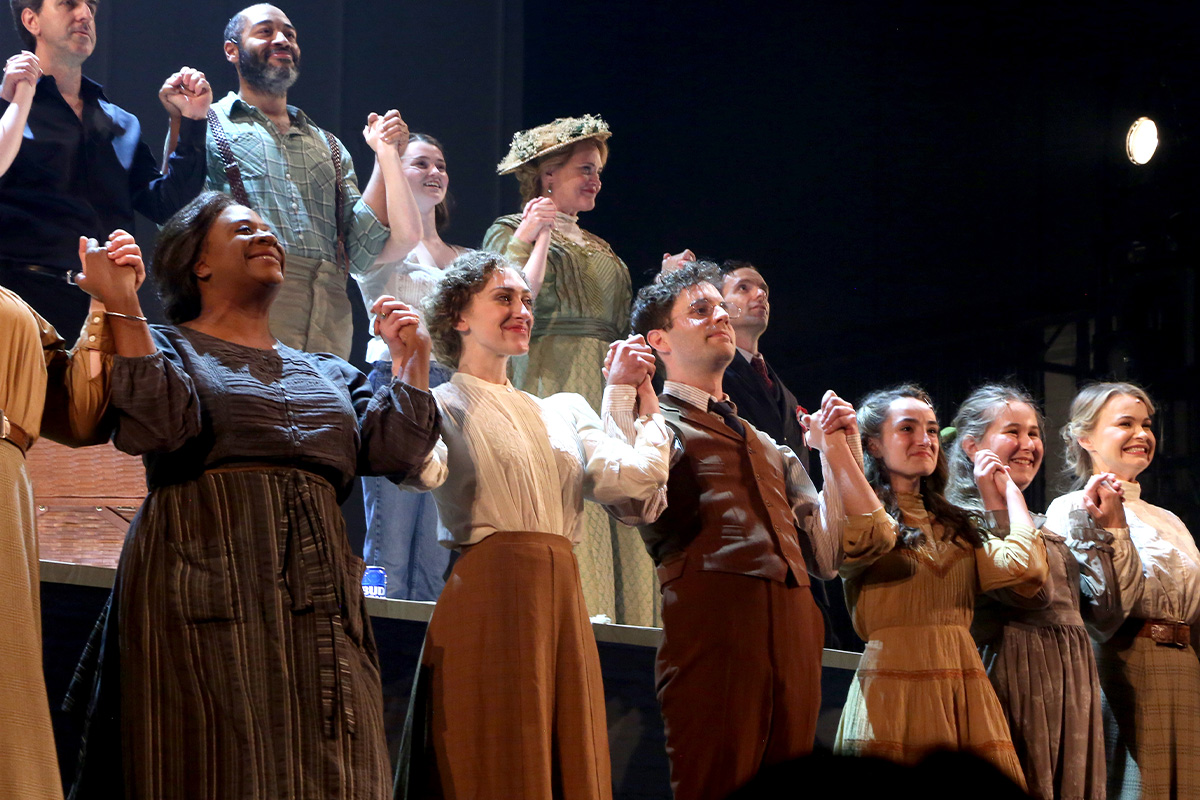When I want quality Jewish representation, I often turn to the New York stage. The high-caliber and comparatively interesting Jewish stories that consistently find an audience on Broadway are without parallel in mainstream film or television. I enjoy “The Marvelous Mrs. Maisel” well enough, but when New York theater provides everything from a musical about bored Israelis entertaining an Egyptian police band to a play about Yiddish-speaking lesbians, it’s not even a contest.
So it’s not unusual that there are multiple shows this season with substantial Jewish content making headlines and earning critical acclaim. The fact that we have both Tom Stoppard’s new play “Leopoldstadt” and the well-received Gala presentation of Jason Robert Brown and Alfred Uhry’s “Parade” might seem, at first glance, par for the course.
And yet, something about this season feels different.
Maybe this is because both stories are not just about Jews but specifically about lethal antisemitism. “Leopoldstadt,” by the legendary Tom Stoppard, follows multiple generations of a wealthy, assimilated Viennese Jewish family from the turn of the century through the 1930s and into 1950s. “Parade,” meanwhile, is a musical by Jason Robert Brown that chronicles the 1913 murder of 13-year-old Mary Phagan and the trial and subsequent lynching of Jewish factory manager Leo Frank. In both shows, you know exactly how they’ll end before the actors even open their mouths. There are no surprises, reprieves or happy endings here.
Maybe it’s because this is coming at the end of a year whose big New York stand-up comedy hit was Alex Edelman’s “Just For Us,” in which Edelman recounts the time he dropped in on a meeting of white supremacists and reflects on his Modern Orthodox upbringing. Maybe it’s because the Yiddish translation of “Fiddler on the Roof” is back for a limited run just in time for the holiday season. It’s been heartening to see stories that are not just about Jews, but also unapologetically targeted toward Jewish audiences, be viewed as commercially successful rather than as niche curiosities.
Maybe it’s because the biggest piece of theater gossip of the year involved Beanie Feldstein being pilloried for the crime of not being Barbra Streisand until she was forced from her role in “Funny Girl.” Maybe it’s because “This Beautiful Future,” a Nazi romance, is running downtown.
Or maybe it’s because every time I go online, I see some fresh scandal surrounding a major political or cultural figure spouting off an antisemitic conspiracy theory. It feels as of late like I’m never not thinking about antisemitism; the ever-growing chorus of it from all walks of life has created this distorted idea of who we are as a people that is at once totally absurd and incredibly dangerous to us.
It’s been a strange and eventful time to be a Jew and Jewish theatergoer, for better and for worse, The last six months alone have made me long for a bit of Jewish joy.
Neither “Leopoldstadt” nor “Parade” gave me that — but what they did give me may have been even more cathartic.
It wasn’t just that both productions prioritized casting Jews, though that certainly mattered. From the simple fact that everyone pronounced Hebrew words properly, to the preponderance of thick curly hair in both productions, to the absence of nasally accents or other exaggerated, nebbishy affects, it made a world of difference in the details to let Jewish actors tell these stories.
But beyond the curls and mannerisms, these stories brought to life Jews I recognized.
In “Leopoldstadt,” I saw my own family history. The sprawling, affluent Jewish family depicted on stage — a mix of assimilated and intermarried Jews — and the very details of the family tree were virtually identical to my own, to the point of being uncanny. I have seen Holocaust stories of assimilated Jews before, but none quite managed to bring to life something I recognized from my family’s own fragmented chronologies of that time period — the sense of trust in modernity and culture that was ultimately so violently betrayed.
In “Parade,” I saw myself and my friends. This particular presentation marked the first time not only that a major professional production has cast Jewish actors as both Leo Frank and his wife, Lucille, but also that the actors were roughly the ages of the characters they played. Typically, middle-aged actors have played the Franks, but the real Leo and Lucille were in their 20s as these events unfolded. I have been a longtime fan of the show, but I did not realize until sitting at New York City Center that I’m currently the age Leo Frank was when he was arrested — that the Franks would have looked like the couples I know. Ben Platt and Micaela Diamond are tremendously talented performers, but the youth and vulnerability they bring to Leo and Lucille is what made the production feel real.
Ultimately, what I saw in both productions wasn’t just Jewish stories. I saw real people. And in a climate where discourse about how Jews are fake and how antisemitism is a weapon Jews wield to ruin basketball careers or Adidas contracts or political campaigns, we’re all being forced to reckon with someone else’s fun house version of who we are. For me to combat that, I needed more than joy. I needed an unwarped mirror. I needed storytelling that rendered us as real — rendered our pain as relevant and rendered antisemitism as deadly to us. I needed, however harrowing, a reflection I could recognize.



